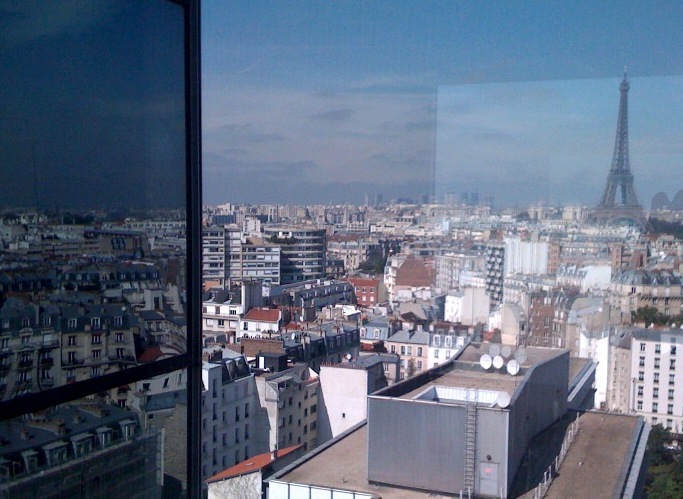Media Literacy 101: Of Toilets, UNESCO and Demand-Side News
by Susan Moeller
Posted: September 22, 2009 09:22 PM
The ladies bathroom on the 13th floor of UNESCO's building in Paris has the best view of any restroom in the world. As you clean and dry your hands (the stalls are around the corner), your back is to a large picture window that looks over the rooftops of the city--straight to the Eiffel Tower.

The Eiffel Tower out the window of UNESCO's 13th floor ladies' room.
With a view like that even from the washroom, it's no wonder that the bureaucrats in the building believe they have a special perspective on the world. Or, at least in the workshop that I'm sitting in, that they believe that they have the insight that's needed to simultaneously rescue journalism as well as foster democracy in the developing (and the developed) world.
The insight is media literacy. "Media literacy gives citizens the essential knowledge that makes them realize that they must protect media from suppression of all kinds"--political and economic, said Wijayananda Jayaweera, the director of UNESCO's Communication Development Division, when he opened the workshop session. This means, he added, that "media literacy demands citizens' conscious engagement in democratic processes."
Actually, Jayaweera's take on the role of media in society is similar to that of President Obama, the self-described "big newspaper junkie," who noted this week that good journalism is "critical to the health of our democracy."
But while Obama has said he is "happy to look at" the rescue proposals before Congress that would give news outlets tax breaks if they were to restructure as not-for-profit organizations, the rescue plan that Jayaweera and his colleagues are looking at is a revamped curricula for K-12 schools in the 193 member countries of UNESCO.
UNESCO wants to teach teachers the world over to incorporate media literacy training in their classrooms, and the Paris workshop is an early step in its launch of a "Media and Information Curriculum for Teacher Education" in member countries. If that global curriculum can take hold--although I realize I'm simplifying things just a tad--UNESCO believes that stronger democracies and greater access to news and information will follow.
It is true that rediscovering the public service function of the news business by creating a non-profit cadre of outlets is an idea worth pursuing. As is, for that matter, another option being pursued in the United States: building entrepreneurial tracks into journalism schools in the hopes that some bright young student (or hopefully many bright young students) will invent the next news platform--and additionally conceive of a business model that will salvage the existing mainstream media outlets. In fact entrepreneurialism should have been implemented in j schools en masse a decade ago.
It's just that those are both solutions from the supply-side, and the experts that UNESCO has gathered are interested in the demand side, the audience for media: i.e. the rest of us.
This group of media literacy experts gathered from five continents are committed to empowering citizens. They stubbornly refuse to label the global media's audience as "consumers" of news, instead preferring to focus on that audience's role as "citizens." Challenging today's youth--tomorrow's citizens--to support media in their role as the essential "facilitator of democratic public discourse," these experts think, and inspiring those students to demand accuracy and fairness from the news media, will serve to put pressure on both governments and media.
So bringing media literacy into schools makes sense.
First, there are more students in the world than there are media outlets, so if one wants to build a critical mass to call for change, it makes sense to engage the large and technologically adept demographic of the world's youth. Educate this up-and-coming generation to understand what it can do locally and globally--and how it can insist on change responsibly.
And second, many of those youths are already active "prosumers" of news: people who not only digest news but also document the world around them, both to get the word out about what they eyewitness, as well as to call attention to injustices they see. Teach students to recognize and value fair and accurate reporting--of others and of their own Twitter and Facebook and YouTube documentation.
Now, really, I'm not so blinded by the great view out the windows of the 13th floor toilets that I think this can all happen as neatly as it sounds here. UNESCO is a clumsy bureaucracy to wield even a brilliant Global Media Literacy curriculum as a tool to bring about mass change.
But I do think the media literacy experts are on to something. Revamp journalism by educating tomorrow's audience. Don't forget the business/advertising-side of the problem of the news industry, but reconsider the audience side. Look beyond the wishful and likely chimerical solutions of micro-payments and subscription services to support online news, and start thinking about how to educate the world's next generation. Some forward thinkers already are.

Looking the other direction out UNESCO's 13th floor ladies' room: to Hôtel des Invalides.
--
Original article can be read http://www.huffingtonpost.com/susan-moeller/media-literacy-101-of-toi_b_295511.html.
Views: 7
© 2025 Created by Ryan Goble.
Powered by
![]()